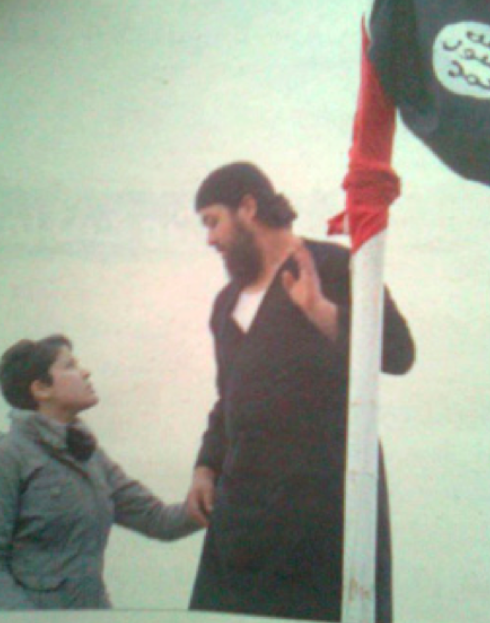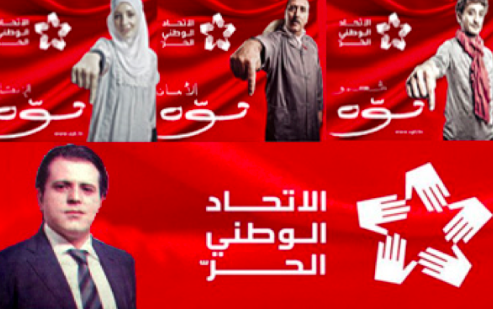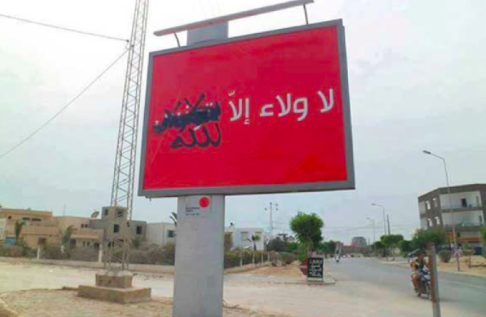Tunisia is currently experiencing an intense hyperbolization of political sentiment. The glorification of the flag originates from multiple factors. Since the first demonstrations following the fall of the regime, the use of the flag has been a sign of a sort of national communion. Today, it has become an object of struggle. Who bears true national legitimacy? Is it the party selected through elections? Is it the opposition party, which claims legitimacy of a different order? Which territories? Which generations? It is difficult to situate and include all its components. Such a comprehensive listing could stretch indefinitely.
One Mission: To Save the Arab Revolutions
Several corresponding factors could explain the current flame of patriotism—all of which could be summarized by a feeling of urgent necessity to “save the Tunisian revolution.” Often described as the “the last hope,” this feeling gives many Tunisians a mission they perceive as quasi-sacred. As François Hollande said during his speech to the Tunisian National Constituent Assembly in July 2013: “You carry a hope that extends beyond the Tunisian people, well beyond the Arab people.”
The responses to this alleged task, which has uncertain contours but is imagined by all as a “national duty,” are diverse. In one sense, it gives rise to a Tunisian particularism, most often expressed with formulas such as “Tunisia is not Egypt” (or not Syria, or not Qatar, or not Europe), or by the absolute: “Tunisia is unique.” Depending on its interlocutors, this discourse is constructed on the idea of the peaceful nature of Tunisians, on the legacy of Bourguiba (and his influence on demography, for example), on the education, or even on the climate. Sometimes, it is simply the insignificance of the country that is claimed, ironically, as an opportunity: Tunisia, so little, could not be coveted. Thus, it must be possible to succeed in revolution.
Despite unfurling the flags and proclaiming an ostentatious national pride, the success or failure of this mission is often paradoxically perceived as independent of the will or the action of the Tunisian citizenry. For the enunciation of a national duty to hold firm, it often feeds on the impotence of international conspiracies, geopolitical theories, and suspicions that weigh on the political class in its entirety, among others. This discourse sometimes even goes so far as to cast the Tunisian Revolution (the same one that it declares necessary to save) as an invention (be it occidental, American, Israeli, Qatari, Saudi) so as to reshuffle the deck of cards in the region. The elections in October 2012 fed this suspicion: they must have been manipulated to give power to the Islamists, who are allied with the United States (or others, depending on the rhetoric). These arguments must not be taken lightly. They are signs of the installation of a long-lasting regime of uncertainty that has continued to intensify and thus engulf the country in a climate of fear, giving way to the feeling that “anything could happen at any time.”
A final sense in which this national duty is imagined, invoked more by those in politics, is the “sacred union” that certain “events” may require. These events are disturbing notions that cannot be forcibly characterized as political or economic crises but rather as a state of enduring global crisis. Nonetheless, the political consensus is proclaimed constantly, like an incantation, especially as tension and opposition is high between the different political paths. Additionally, it is based on a voluntary confusion between patriotism and national unity. The latter assumes a state of war and requires the silencing of opposition. The former, if it requires the respect of country and nation, does not necessarily imply the silencing of disagreement and opposition within them.
The Struggle of the Flag
This patriotic exaltation must be placed in its context of the diffusion of fear, which different channels of information and political discourse instill. This fear, which was believed to have fallen like a wall after the 2011 revolts, has taken another form: it is no longer the fear of the regime, of the state, that makes what Béatrice Hibou called “forced obedience.” It is a more diffused fear, which combines the difficulty in obeying or respecting hierarchy (tainted civic capability, visible dysfunction of public services) with a disorderly panic in the face of real or imagined danger. Certain people invoke the “Egyptian scenario” as an eventuality like a scarecrow or a barely veiled threat--others cite the Salafist peril or a more general insecurity (pedophilia, crime, etc.).
All of this has driven political actors to prioritize saving Tunisia and its revolution. However, this unanimous display of patriotism hides a ferocious struggle for national legitimacy. Each actor has his/her own idea of Tunisia. The central question becomes “where is the national interest?” and who is best serving it today. Each then returns to a supposed treason in a new national and widely remarked bipolarity (Ennahda/anti-Ennahda). One of these groups attests that the Islamists–including Ennahda–have never been in the service of the Tunisian nation. They are but marionettes whose strings are between the hands of some international actor, whether it is the Muslim Brotherhood or the jihadists. The information that is published on Tunisian news sites circulates rumors that suggest, for example, Rachid Ghannouchi’s visit to Istanbul in the middle of July could have been an occasion to participate in a secret meeting held by the Muslim Brotherhood. The meeting was said to have been for the purpose of electing the president of the political bureau, the number two in power. Meant to offer proof that the meeting was held, videos from an Emirati channel show people moving about in what resembles the hall of a hotel.
Faced with these suspicions of infidelity to the nation, the Ennahda party members countered with a national display differentiating themselves from the Salafists associated with the black flag. The replacement of the national flag with a Salafist flag at Manouba University on 7 March 2012, and the indignation it provoked, marked the national spirit. The young student who was used as an intermediary, Khaoula Rchidi, who is seen in the image below facing a Salafist student in an attempt to protect the Tunisian flag, was at the time solemnly thanked and decorated by the President of the Republic.

[Image of the flag incident at Manouba University on 7 March 2012. Image provided by author.]
Since then, the mobilization of politicians in the current government insists on the legitimacy of the Islamist party in power and its national character. The reference to the Turkish example is used to show that the Tunisian Islamists, like their Turkish counterparts, do not seek to export their model, but only to instill it in a national context. The latest demonstrations that followed the assassination of Mohamed Brahmi, on 25 July 2013, are of a distinctly red color, while the pro-Ennahda demonstrations following the assassination of Chokri Belaid (9 February 2013) were composed of the flags of the party, white with a blue logo. At these demonstrations, the Salafist flags were also present en masse. The partisan image of these gatherings was replaced by the centrality of national legitimacy and its color–red.
The business world has also made its entrance in this field. “There is no allegiance except to Tunisia” (La wala’illa litunis) say immense billboards in all of Tunis.[i] The formula is strange; the basis of the national flag is an implicit echo of the Muslim profession of faith (there is no god but Allah). Red spots have invaded public space: bus stops and billboards of all sizes, with or without the slogan. This organized and institutionalized form of political posting, outside of an election campaign period, is striking. Also visible are the portraits of martyrs, printed in color, hanging here and there, on storefronts and on walls. Sometimes, a banner is used to commemorate the martyrs on the walls of a building. What strikes the viewer in this campaign is its ubiquity. It has replaced the advertisement in the city. Knowing Tunisia’s economic hardships and imagining the cost leads one to wonder; what does this mobilization mean and from where does it originate?
Since last January, the economic sphere has become increasingly present in Tunisia’s political landscape. Slim Riahi, leader of the young Free Patriotic Union liberal party (UPL) is known to have facilitated the meeting between Béji Caïd Sebsi and Ghannouchi in Paris in mid-August. Amongst the entrepreneurs, the communication experts and the media owners were on the front lines. There is a legitimate desire to preserve the freedom of expression in the face of Ennahda’s “totalitarian” (although this is undermined by the condemnation of the director of the channel Ettounsia and founder of the production company Cactus, Sami Fehri, or through other accusations targeting journalists). This is part of the explanation. But also of note in this initiative is the presence of a Tunisian liberal lobby close to the opposition in social and regional proximity and even in family ties. There is an emergence of a generation of “leaders” who want their economic success to benefit political activities in this new democratic context. Most of these entrepreneurs in their forties had started their career under Ben Ali and were then criticizing the corruption of the president’s circle, as well as the breaks that this predation represented for the smooth running of business. After a period under the radar, those circles are now very much present through their economic control and the organized posting campaigns and through their support of Nida Tounes and its old leader, Béji Caïd Sebsi. The paradox of this new language of political communication is its “youth-oriented” display and its massive support of a leader in his eighties.
Berlusconization?
Four personalities are specifically emerging: Sami Fehri, a forty-one year old director of the channel Ettounsia and founder of the production company Cactus, in jail today; the Karoui brothers (Nabil, forty-eight years old and Ghazi, forty-six years old), owners of the Moroccan channel Nessma TV and of Karoui & Karoui world, a communication company; Slim Riahi, a thirty-nine year old businessman who has recently entered the communication industry (Essebah), owner of the Tunisian “African Club” football club, and founder of the Free Patriotic Union.
The Karoui brothers were at the center of the news when they aired the film Persepolis. Nabil presented his apologies after he was prosecuted for disturbing the public order. His trial was perceived as the first sentence impeding on the freedom of expression after the Ben Ali era. The two brothers had built their empire in the 1990s, between Algeria and Tunisia, by partnering with Berlusconi and the producer, Tarak Ben Ammar. They are today somewhat self-effaced, while welcoming the “La wala’illa litunis” campaign on their network.
Sami Fehri is also a media figure. He founded the production company Cactus in 2002 and is now partnered with Ben Ali’s brother-in-law, Belhassen Trabelsi, to fund entertainment shows and Ramadan soap operas (Maktoub). He founded his own television channel, Ettounsia TV, in March 2011. His legal troubles, which explain his imprisonment, were based on the suspicions that he had illegally used resources from the Tunisian national television. The channel he founded, today suspended and hosted on another private channel, al-Hiwar al-Tunisi, is considered to be the most watched channel in the country.
Slim Riahi is probably, among those few forty-somethings, the most politically engaged. He took part in the October 2012 elections as the head of his party, UPL. He developed a campaign to attract voter with a simple and efficient slogan, tied to an immediately recognizable gesture.

[Campaign of the Free Patriot Union, summer 2011. Image provided by author.]
Riahi seems to possess a considerable wealth, collected thanks to his Libyan connections in the construction and oil industries. He is the typical businessman engaged in a political spectacle: at the head of a football club, investing in social work and press groups.
These young entrepreneurs and media figures project an image of a Tunisia that seems to be the core of their politics: “their Tunisia” is open to the world, liberal, accepting, and enterprising. “Their Tunisia” also coincides with the rise of the human rights of the Tunisian woman, with the desire to maintain an open market, and the containment of the threats to order and security in Tunisia. The UPL campaign, articulated around the word “Tawwa,” now adds a sense of urgency (campagne « tawwa »)—with characters supposed to represent Tunisia in its diversity, demanding the end of a state of servitude, of unemployment, of painfulness. All of this is presented with a brushed up visual aesthetic, contrasting the realities of the country.
The private television channels all together reflect a desire to give a voice to Tunisians, but also to convey a light, free, and modern image. The talk shows are modeled after their European or American counterparts, columnists interrupt the discussions in debates that are too long, comedies are slowly emerging (including a local version of the French program “Guignols de l’info,” today defunct). The most popular shows (particularly the political ones) are immediately discussed and analyzed on social media and beyond. This combination of private television and social media creates an imagined Tunisia (an imagined community, in the words of Benedict Anderson), which becomes an implicit site of reference for the Tunisian urban elites. This implicit nation is fed by polls, consumer research, and takes little time to understand or analyze what brings, for instance, a great part of the population to support the regime in place or to completely desert political debates.
Epilogue: New Configurations?
In addition to the patriotic display, the Irhal movement emerged on 24 August at the doorsteps of the National Constituent Assembly of Bardo. It established itself as a movement of national salvation. The elected members claim to be the defenders of legality. Elsewhere, an advisor to the president claims “to preoccupy himself first with the common good.” This is the political landscape that exists in Tunisia today: almost a staged and scripted landscape. However, beyond those cameras movements, we are waiting to see the emergence of new configurations, as the country seems to be suffocating under those who lay claim to it.
Is there a policy, which can include both strongly anti-Islamist modern elite—we have to remember that Ben Ali’s elites proclaimed their allegiances under an anti-Islamist pact—and a society that is more Islamicized? Is it the only fracture that needs to be emphasized? Are there not territories that are ignored and more patent inequalities? In this game of symbolic appropriation (flag, anthem, “Tunisian” Islam versus ‘Gulf’ Islam, language, etc.) it is clear that binaries cover once more the essential: the growing poverty, indebtedness, the vulnerability of households, and the absence of a future for the youth. It is thus not surprising to see posters becoming the site of a more subtle and diverted struggle.

[An “Islamist” diversion on a poster, replacing "Tunisia" with "Allah" in the slogan "There is no allegiance except to Tunisia. On the panel, the logo of Karoui & Karoui. Image provided by author.]
[This article was originally published in French on Jadaliyya and translated to English by Audrey Ann Lavallée-Bélanger and Allison L. McManus.]
[1] Though I only visited the Greater Tunis during my last stay, according to my information, such panels are present in the twenty-four Tunisian governorates. They are funded by the Tunisian Union of advertising agencies and notably, Karoui & Karoui World.
[2] There are two main Football clubs in Tunis, the African Club led by Roahi, and L’Esperance sportive de Tunis, today owned by Mohamed (Hamdi) Meddeb, leader of the STIL, agribusiness firm, fifty percent of which is today owned by Danone, which is close to the previous government. Should we note a connection between this fact and the fact that the only ads seen in August in Tunis that escaped the patriotic campaign were those of the dairy company, Danone?
[3] Aziz Krichen, on his Facebook page, 24 August 2013.